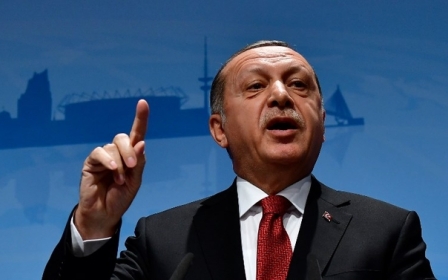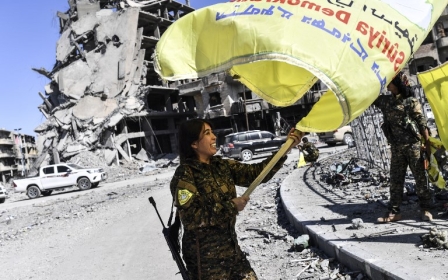Kurds protest in Paris against 'assassin' Erdogan

Thousands of Kurds protested in Paris on Saturday against Turkish President Recep Tayyip Erdogan and the failure of the French authorities to convict anyone over the 2013 murders of three female Kurdish rebels in the French capital.
The demonstrators repeatedly chanted "Erdogan, assassin" in reference to the Turkish president, who held talks in Paris with French President Emmanuel Macron on Friday.
"Five years of silence, five years of denial of justice, five years of impunity," read one giant banner held aloft at the forefront of a demonstration which police said numbered about 4,700.
The bodies of the three women - Sakine Cansiz, a 54-year-old founder of Turkey's outlawed Kurdistan Workers' Party (PKK), Fidan Dogan, 28, and 24-year-old Leyla Soylemez, were found with bullet wounds to the head and neck in central Paris in January 2013.
The only suspect in the killings, Omer Guney, a Turkish national, died in a Paris hospital in 2016 while he was being detained in prison pending trial, ABC News reported.
The Turkish national intelligence agency MIT officially denied any role in the killings, but French investigators at the time concluded Turkish spies were "implicated" in the case, according to a judicial source.
Ali Dogan, brother of Fidan, demonstrated with other family members and said they "no longer have hope" of justice.
"I watched on television the press conference between Erdogan and Mr Macron yesterday. It's sad that the president did not mention the murder of my sister... it seems that we are hiding things and France doesn't want to divulge information to preserve its interests" with Turkey, he told AFP.
The Turkish state has fought a decades-long conflict against the PKK, which has resulted in about 40,000 people being killed since the 1980s.
Middle East Eye propose une couverture et une analyse indépendantes et incomparables du Moyen-Orient, de l’Afrique du Nord et d’autres régions du monde. Pour en savoir plus sur la reprise de ce contenu et les frais qui s’appliquent, veuillez remplir ce formulaire [en anglais]. Pour en savoir plus sur MEE, cliquez ici [en anglais].




